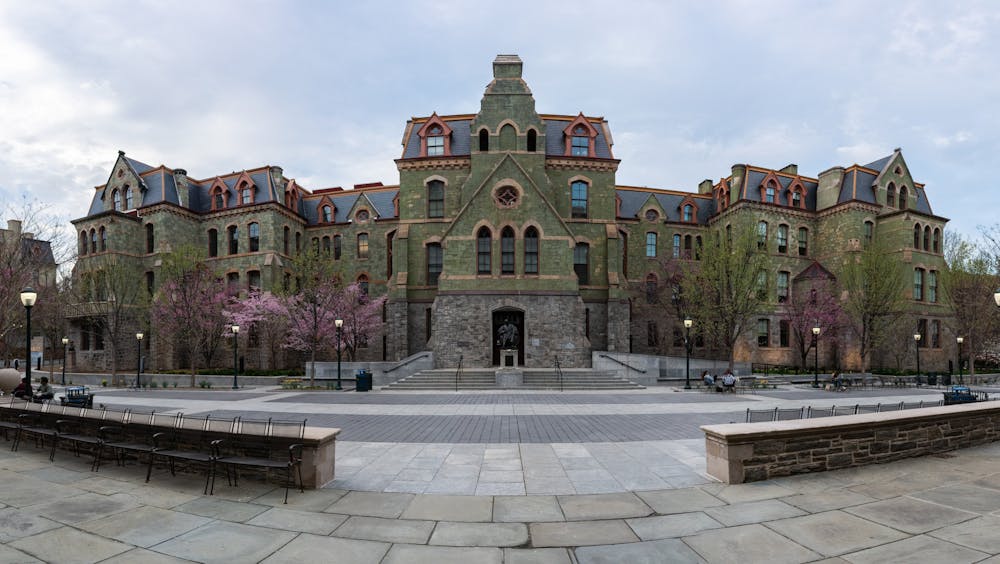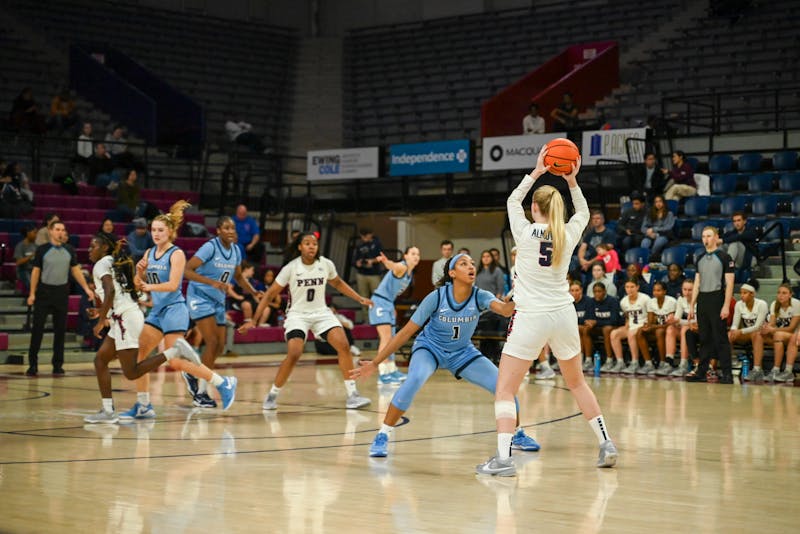
College Hall on March 30.
Credit: Devansh RaniwalaThe federal government has revoked “at least three” Penn students’ visas and terminated their immigration statuses, according to an email from International Student and Scholar Services on Monday morning.
The April 7 message states that Penn learned of the changes to the students’ immigration statuses through a check of the Student and Exchange Visitor Program database — an online system managed by the Department of Homeland Security that tracks the records of international students studying in the United States. According to the email, the visa revocations were in relation to “immigration status violations and not connected to the 2024 campus protests.”
The revocations at Penn come as 1968 Wharton graduate and President Donald Trump’s second administration cracks down on international scholars across the country. Over 100 students, faculty, and researchers at American universities have faced similar actions — with many reporting they have not received direct notice from the federal government.
Requests for comment were left with ISSS and the Department of Homeland Security. A University spokesperson declined a request for comment.
At the time of publication, The Daily Pennsylvanian could not determine the identities of students affected by the visa revocations or the exact time the status changes were made.
The email — which was signed by Vice Provost for Global Initiatives Ezekiel Emanuel and Vice Provost for University Life Karu Kozuma — specified that while Penn is “aware of reports of encounters with ICE agents at Penn,” federal agents have not been on campus in connection with the identified visa revocations.
“We want to reassure the community that we are monitoring and investigating all reports and providing appropriate support to people when these incidents arise,” the email stated. “This is an extremely unsettling time for international students and scholars at Penn and in the United States. Know that we will make every effort to provide you with timely guidance about recent immigration policy changes.”
On Sunday, ISSS launched a “SEVIS Termination F.A.Q.” webpage, providing guidance to international students on what to do if their visa is revoked. The website states that a SEVIS revocation indicates an individual’s “F-1 or J-1 immigration record is no longer active,” which “usually happens when a student is out of compliance with U.S. immigration rules.”
“A terminated SEVIS record means you are out of status and can’t legally study, work, or remain in the U.S.,” the website states. “Depending on the circumstances, you may begin to accumulate unlawful presence from the date of termination.”
The site notes that “In cases triggered by outside agencies, the termination may happen without notice,” also stating that some visa revocations are “automatic and triggered by outside agencies” — including the Department of State or law enforcement databases.
The SEVIS “Terminate a Student” page states that once a student visa is terminated, the individual must leave the United States immediately and cannot reenter the country. Immigration and Customs Enforcement agents are also authorized to investigate and confirm the departure of the student, according to the page.
International students themselves are only informed of changes to their immigration status by email notifications sent to the unique address through which they initially applied for their visas.
In February, 1968 Wharton graduate and President Donald Trump signed an executive order directing federal agencies to identify and deport noncitizen participants of pro-Palestinian protests.
“To all the resident aliens who joined in the pro-jihadist protests, we put you on notice: come 2025, we will find you, and we will deport you,” Trump said in the fact sheet for the order. “I will also quickly cancel the student visas of all Hamas sympathizers on college campuses, which have been infested with radicalism like never before.”
Since then, nearly a dozen pro-Palestinian student organizers and professors have been detained by ICE agents and deported.
At a press conference on March 27, Secretary of State Marco Rubio announced that the Department of State had revoked more than 300 student visas — some of which belonged to students who participated in pro-Palestinian activism on college campuses.
In an April 1 email to the international student community, ISSS reported that they were “not aware” of any Penn student or faculty member who had been impacted by recent visa revocations from the State Department.
The email — sent by Emanuel and Associate Vice Provost for Global Initiatives Amy Gadsden — added that the University was in “communication with government officials to convey how unsettling these policies are for our community.”
At the time of publication, universities across the country discovered that over 100 students have had their visas — and, in some cases, legal residency status — revoked through proactive checks of the SEVIS database. Many administrators from these institutions have stated that they were not directly informed of the changes by the government and were not provided with reasoning for the revocations.
On April 6, Harvard University administrators announced that a “routine records review” revealed that three students and two recent graduates had their visas recently terminated. The same day, four international students attending Columbia University had their visas revoked.
“Penn deeply values its international community and remains dedicated to fostering an environment where students and scholars from around the world can thrive,” the April 7 email concluded.
The Daily Pennsylvanian is an independent, student-run newspaper. Please consider making a donation to support the coverage that shapes the University. Your generosity ensures a future of strong journalism at Penn.
Donate









